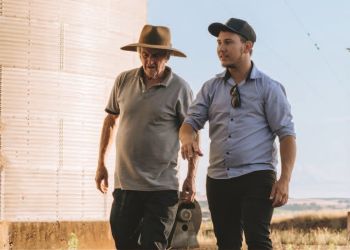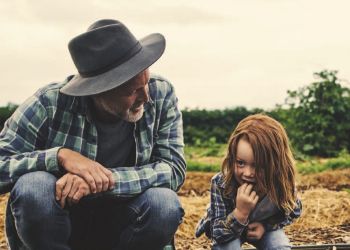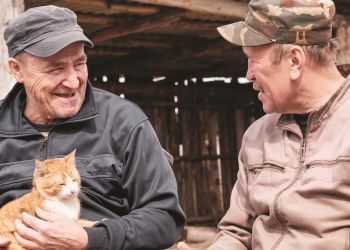 In the second year of the Preparedness Summit Podcast series, take a deeper dive into the subject of preparedness with some of the most fascinating Summit speakers. In the second part of this interview, Andrew Salkin, Chief Operating Officer of 100 Resilient Cities, shares more about this groundbreaking organization funded by the Rockefeller Foundation to help cities around the world become more resilient to physical, social, and economic challenges. Read the first part of his interview. Download the full podcast here
In the second year of the Preparedness Summit Podcast series, take a deeper dive into the subject of preparedness with some of the most fascinating Summit speakers. In the second part of this interview, Andrew Salkin, Chief Operating Officer of 100 Resilient Cities, shares more about this groundbreaking organization funded by the Rockefeller Foundation to help cities around the world become more resilient to physical, social, and economic challenges. Read the first part of his interview. Download the full podcast here
How do cities become more resilient in the face of budget cuts, especially in public health?
It’s really complicated to do. The challenge you’re highlighting is that the budget is getting cut, the problems are getting more intense, they’re becoming more dramatic and harder to solve and if you don’t change the way you do business, it’s not going to work anymore. The challenge cities have is that whatever they did before got them where they are today, so if the answer is giving them more money to do more of the same, it isn’t a good investment. What does it mean for a city to begin doing something different? This is where the CRO becomes really critical. They can begin to bring together different actors. It’s not going to be just the police department and the economic development partners, but it’s going to be the academia, the nonprofits, the faith-based groups, and the community groups.
These partners should be working together to address their problems, evaluate their resources in order to start fixing them. They should be asking how to align themselves and make sure that whatever they are doing, whatever their budget allows, helps them make progress in tackling these challenges. For example, in most cities I’m sure every agency has some kind of community outreach program. If the Department of Health and Health Services is critical to getting to the people, they should actually partner with something like the parking ticket agency so when residents are paying their fines they’re also learning about public health. I know that sounds ridiculous, but think about the opportunity that could create and how it could turn negative experience into a positive one that could have profound impact and change at a neighborhood level. It’s only going to happen when you begin to ask tough questions and organize yourself in a different way. This is what we hope our program allows our member cities to do and that they can begin to teach each other and the rest of the world.
Because sustainability is key for most initiatives of this scale, how do cities become smart cities that understand their capacity to become a resilient city?
The first step is to get them to be smart with the information they have so the decisions they’re making are the right decisions and that they’re being coordinated together. One way to become smart is to make sure that public health practitioners are sharing concerns and problems with their colleagues in the city agencies tasked with economic development, zoning, and public works. These agencies should be integrating your concerns into how they’re designing projects and solving problems. At the same time, it’s important for public health to know what other agencies are trying to do because you might be able to solve some of their concerns about engaging with the public for example. When the city becomes smart that way, you start to see opportunities emerge. When those opportunities emerge, you start to tackle challenges slowly but surely and eventually you’ll have a big impact.
How do cities address the challenge that private partnerships might encourage cities to make changes that won’t necessarily help them to become smart cities?
One of the things we’ve tried very hard to impress on cities is that it’s not enough to say, ‘I want to do what “City X” did and purchase the same product.’ Cities should have a sense of why they want to take certain actions. That’s where data really becomes interesting. Does your city know what the people feel like, what different communities are thinking, what problems they’re experiencing? Do you know what the best data you have available is? Cities don’t always need new data, they just need to know what they have. Quite often data is caught in different silos of government.
If you bring that information together, you can make informed decisions. Wouldn’t be great if it weren’t about companies telling the cities they need to be a smart city, but the cities saying to private companies, this is what we need for our next step in building an intelligent city? It might not mean the best and newest technology, but maybe it’s helping cities better leverage technology that’s 20 years old.
In Norfolk, VA, the program was really successful in a partnership that they did with a big data integration organization. The city was able to take building-level and flood-level data and integrate the data in a new way. They were able to put it into an accessible app for their community relations team. Before it would take six weeks to get back information about the last major flooding event to the community. Now their community relations team is armed with the information at their fingertips so they can actually have a robust conversation with their partners. This changes the whole conversation..
This idea is that they are able to build a strong point of view about what their real challenges are. Too often cities don’t have those visions or agencies don’t come together in a way that forms this common goal that everyone can work toward.
For the most part, NACCHO members are smaller health departments, how can they begin work like this?
Not only are they smaller but often employees are wearing multiple hats. I think it’s really critical that smaller communities and governments leverage the fact that they’re smaller and already know the people they should be partnering with.
They should ask whether they are partnering in a way that allows everyone to support the goals you have for your organizations. Just because you’re a small town, it doesn’t mean your leadership can’t take a bold call to action for all members of the community. In public health, as people begin to prepare for the challenges of the summer whether its mosquito-borne viruses, or heat, or rain and big storms, there’s nothing that I think is too controversial that a community couldn’t come together over the fact that they need to be better prepared. Being better prepared means building the stronger bonds to begin with and thinking about how you leverage those investments to make sure that you’re being successful when something does come because you don’t know what it will be.






